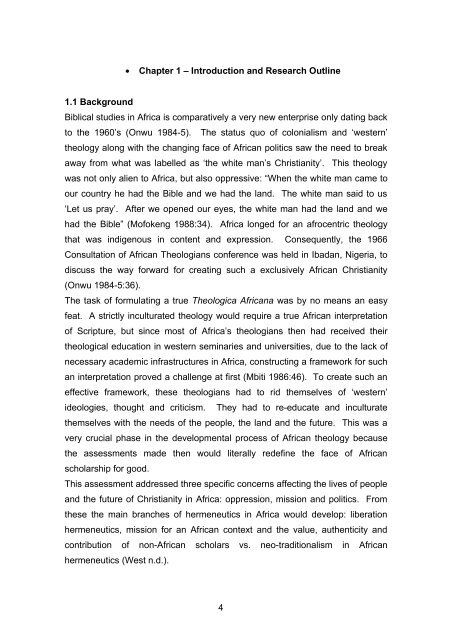African Hermeneutics: The Current State - Theology In Africa
African Hermeneutics: The Current State - Theology In Africa
African Hermeneutics: The Current State - Theology In Africa
You also want an ePaper? Increase the reach of your titles
YUMPU automatically turns print PDFs into web optimized ePapers that Google loves.
1.1 Background<br />
• Chapter 1 – <strong>In</strong>troduction and Research Outline<br />
Biblical studies in <strong>Africa</strong> is comparatively a very new enterprise only dating back<br />
to the 1960’s (Onwu 1984-5). <strong>The</strong> status quo of colonialism and ‘western’<br />
theology along with the changing face of <strong><strong>Africa</strong>n</strong> politics saw the need to break<br />
away from what was labelled as ‘the white man’s Christianity’. This theology<br />
was not only alien to <strong>Africa</strong>, but also oppressive: “When the white man came to<br />
our country he had the Bible and we had the land. <strong>The</strong> white man said to us<br />
‘Let us pray’. After we opened our eyes, the white man had the land and we<br />
had the Bible” (Mofokeng 1988:34). <strong>Africa</strong> longed for an afrocentric theology<br />
that was indigenous in content and expression. Consequently, the 1966<br />
Consultation of <strong><strong>Africa</strong>n</strong> <strong>The</strong>ologians conference was held in Ibadan, Nigeria, to<br />
discuss the way forward for creating such a exclusively <strong><strong>Africa</strong>n</strong> Christianity<br />
(Onwu 1984-5:36).<br />
<strong>The</strong> task of formulating a true <strong>The</strong>ologica <strong><strong>Africa</strong>n</strong>a was by no means an easy<br />
feat. A strictly inculturated theology would require a true <strong><strong>Africa</strong>n</strong> interpretation<br />
of Scripture, but since most of <strong>Africa</strong>’s theologians then had received their<br />
theological education in western seminaries and universities, due to the lack of<br />
necessary academic infrastructures in <strong>Africa</strong>, constructing a framework for such<br />
an interpretation proved a challenge at first (Mbiti 1986:46). To create such an<br />
effective framework, these theologians had to rid themselves of ‘western’<br />
ideologies, thought and criticism. <strong>The</strong>y had to re-educate and inculturate<br />
themselves with the needs of the people, the land and the future. This was a<br />
very crucial phase in the developmental process of <strong><strong>Africa</strong>n</strong> theology because<br />
the assessments made then would literally redefine the face of <strong><strong>Africa</strong>n</strong><br />
scholarship for good.<br />
This assessment addressed three specific concerns affecting the lives of people<br />
and the future of Christianity in <strong>Africa</strong>: oppression, mission and politics. From<br />
these the main branches of hermeneutics in <strong>Africa</strong> would develop: liberation<br />
hermeneutics, mission for an <strong><strong>Africa</strong>n</strong> context and the value, authenticity and<br />
contribution of non-<strong><strong>Africa</strong>n</strong> scholars vs. neo-traditionalism in <strong><strong>Africa</strong>n</strong><br />
hermeneutics (West n.d.).<br />
44


